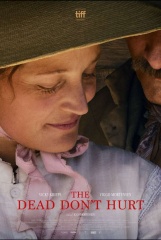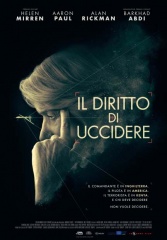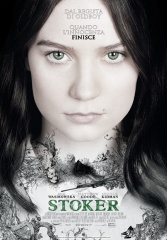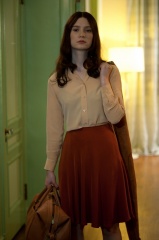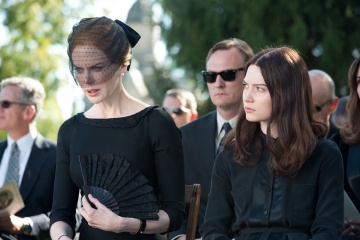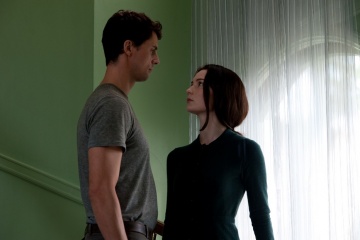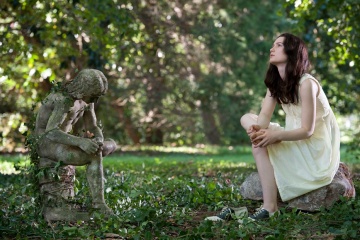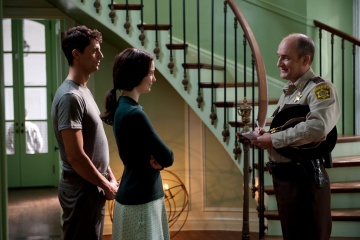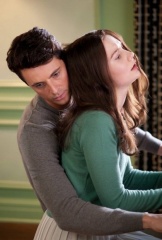|
|
STOKER: NEL THRILLER PSICOLOGICO DEL COREANO CHAN-WOOK PARK, QUI AL SUO PRIMO FILM IN LINGUA INGLESE, NICOLE KIDMAN E MIA WASIKOWSKA
Dal Sundance Film Festival 2013 RECENSIONE ITALIANA e PREVIEW in ENGLISH by GUY LODGE (www.variety.com) - Dal 20 GIUGNO
"Sono persone (gli Stoker) completamente pure. Se hanno un’emozione, la devono seguire fino in fondo, senza prevedere le conseguenze delle loro azioni. Sono intelligenti ed estremamente percettivi. Vedono cose che gli altri non vedono. Ma sono anche ossessionati dall’idea di ‘preservarsi’ e se qualcuno si intromette nella loro vita, sono disposti a tutto pur di proteggere se stessi e le loro necessità ".
Il produttore Scott Free Michael Costigan
(Stoker; USA 2012; Thriller drammatico horror; 98'; Produz.: Fox Searchlight Pictures/Scott Free Productions/Scott Free Productions; Distribuz.: 20th Century Fox)
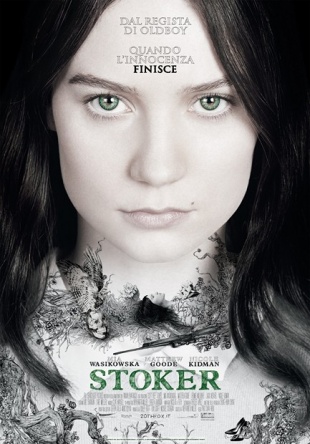 See SHORT SYNOPSIS
See SHORT SYNOPSIS
|
Titolo in italiano: Stoker
Titolo in lingua originale:
Stoker
Anno di produzione:
2012
Anno di uscita:
2013
Regia: Chan-wook Park
Sceneggiatura:
Wentworth Miller con la collaborazione di Erin Cressida Wilson
Soggetto: PRELIMINARIA:
Wentworth Miller, un attore noto soprattutto per il suo lavoro nella innovativa serie TV Prison Break, ha lavorato al copione per un periodo di otto anni. Poiché credeva che nessuno avrebbe preso seriamente la prima sceneggiatura di un attore, ha convinto il suo agente a divulgare il suo lavoro con uno pseudonimo. Così ha scelto il nome di Ted Foulke (Foulke è il nome del suo cane). Il copione è entrato a far parte della 'Black List 2010', la prestigiosa lista non ufficiale dei migliori film disponibili ancora non prodotti.
Cast: Nicole Kidman (Evelyn 'Evie' Stoker)
Dermot Mulroney (Richard Stoker)
Mia Wasikowska (India Stoker)
Matthew Goode (Zio Charlie Stoker)
Lucas Till (Chris Pitts)
Judith Godrèche
Ralph Brown (Sceriffo Howard)
Jacki Weaver (Zia Gwendolyn 'Gin' Stoker)
Alden Ehrenreich (Whip Taylor)
Phyllis Somerville (Mrs. McGarrick)
Wendy Keeling (Mourner)
Lauren E. Roman (Housekeeper)
Tyler von Tagen (Il giovane Richard)
Harry P. Castros (Tassista)
Amelia Young (La ragazza del bus)
Musica: Philip Glass
Costumi: Kurt and Bart
Scenografia: Thérèse DePrez
Fotografia: Chung-hoon Chung
Montaggio: Nicolas De Toth
Casting: Donna Isaacson
Scheda film aggiornata al:
17 Luglio 2013
|
Sinossi:
IN BREVE:
Un'eccentrica teenager vive con la madre dopo la scomparsa del padre. Quando il misterioso zio torna a casa per stare vicino alla famiglia, la ragazza nota in lui degli atteggiamenti molto, molto strani...
IN DETTAGLIO:
La vita tranquilla e solitaria di India Stoker (Mia Wasikowska) viene sconvolta quando, nel giorno del suo 18° compleanno, perde suo padre Richard (Dermot Mulroney), in un tragico incidente. India è una ragazza sensibile, che sfoggia un comportamento impassibile, mascherando i suoi sentimenti profondi e le sensazioni più intime che solo suo padre conosceva e capiva.
Al funerale di Richard, India incontra il fratello di suo padre, Charlie (Matthew Goode), un uomo che dopo una lunga assenza torna proprio con l’intenzione di restare accanto a lei e a sua madre Evie, una donna fragile e instabile (Nicole Kidman). India inizialmente non si fida dello zio, tuttavia subirà il suo fascino misterioso soprattutto quando si rende conto di avere molto in comune con lui. E mentre Charlie inizia gradualmente a rivelarsi, India ne è sempre più infatuata e capisce che il suo arrivo nella loro casa non è affatto casuale. Suo zio è lì per lei, e intende guidarla nell’aiutarla a compiere il suo strano destino.
SHORT SYNOPSIS:
A teenage girl mourning the death of her father deals with an uncle who mysteriously shows up to meet the family.
Commento critico (a cura di PATRIZIA FERRETTI)
|
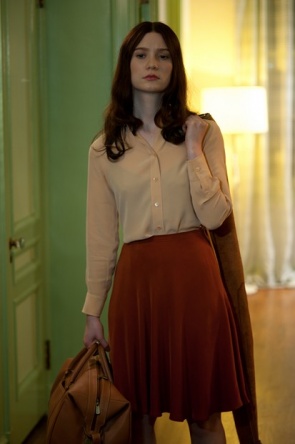 MIA WASIKOWSKA E NICOLE KIDMAN IN BALIA DELLE SINGOLARI ATMOSFERE 'GOTICHE' CREATE DAL REGISTA COREANO CHAN-WOOK PARK CATTURANO L'ATTENZIONE MA E' L'ESTETICA CINEMATOGRAFICA, IL PARTICOLARE TOCCO DI REGIA, A TRATTI VIRTUOSISTICAMENTE LEGATO A SIMBOLI, METAFORE E AD UNA CERTA ARCHITETTURA DI MONTAGGIO, A FORNIRE IL COLLANTE PER UN NOIR FELICEMENTE ALTERNATIVO
MIA WASIKOWSKA E NICOLE KIDMAN IN BALIA DELLE SINGOLARI ATMOSFERE 'GOTICHE' CREATE DAL REGISTA COREANO CHAN-WOOK PARK CATTURANO L'ATTENZIONE MA E' L'ESTETICA CINEMATOGRAFICA, IL PARTICOLARE TOCCO DI REGIA, A TRATTI VIRTUOSISTICAMENTE LEGATO A SIMBOLI, METAFORE E AD UNA CERTA ARCHITETTURA DI MONTAGGIO, A FORNIRE IL COLLANTE PER UN NOIR FELICEMENTE ALTERNATIVO
"Le mie orecchie sentono cose che gli altri non sentono... Io sono questa... così come il fiore non può scegliere il proprio colore...". E' così che India, con la sua voce fuori campo, entra in contatto con lo spettatore, in una sorta di monologo che riecheggia nell'aria, con pause ad effetto celebrate da suggestivi fermo immagine, in una sorta di breve ma intensa seduta di autoanalisi psichiatrica, di presentazione interiore, là dove anima e mente dipendono intimamente da un codice genetico come dire, particolare. Dire di più significherebbe privare il film del suo 'segreto' sinuoso e insinuante, drammatico, con schegge |
|
 dei noir più violenti che sanno comunque evitarsi il compiacimento dello splatter, eppure senz'altro meno reticenti che so, di un noir hitchcockiano, in cui, l'effetto sangue non era mai rosso e non soltanto perché la pellicola era in bianco e nero. Quella gonna svolazzante, cintura e scarpe da uomo, saranno motivi di ritorno in Stoker non tanto come semplici accessori, quanto come indizi-simbolo di un percorso di crescita 'disturbato', in odore di un destino segnato, in cui la genetica sembra giocare un ruolo davvero focale. Con la frequente comparsa poi di altri elementi, come il ragnetto che si inerpica ora su una gamba, ora un po più oltre, si navigano le acque della metafora che si guadagna le cascate di una crescita liberatoria da ogni vincolo o freno, così come pure da ogni possibile ancora di salvezza. Il funerale del padre all'aperto completa quel che si dice un inizio conturbante
dei noir più violenti che sanno comunque evitarsi il compiacimento dello splatter, eppure senz'altro meno reticenti che so, di un noir hitchcockiano, in cui, l'effetto sangue non era mai rosso e non soltanto perché la pellicola era in bianco e nero. Quella gonna svolazzante, cintura e scarpe da uomo, saranno motivi di ritorno in Stoker non tanto come semplici accessori, quanto come indizi-simbolo di un percorso di crescita 'disturbato', in odore di un destino segnato, in cui la genetica sembra giocare un ruolo davvero focale. Con la frequente comparsa poi di altri elementi, come il ragnetto che si inerpica ora su una gamba, ora un po più oltre, si navigano le acque della metafora che si guadagna le cascate di una crescita liberatoria da ogni vincolo o freno, così come pure da ogni possibile ancora di salvezza. Il funerale del padre all'aperto completa quel che si dice un inizio conturbante |
|
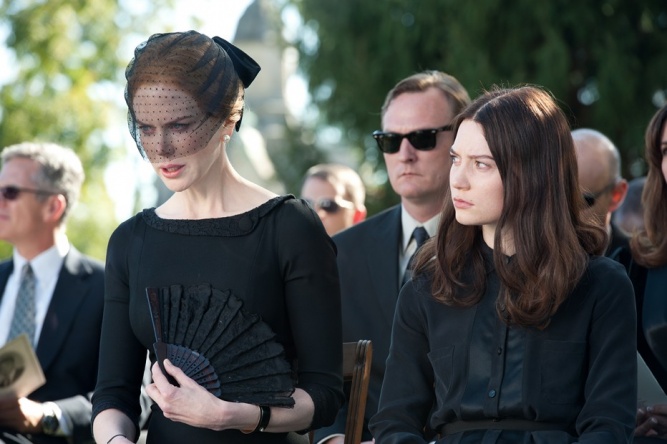 che avanza lentamente - lungi da un tipo di narrazione lineare soppiantato da una sintesi ammiccante, lastricata di oggetti-simbolo appunto, di pedine-indizio che, una dopo l'altra, come orme su un terreno umido, ci condurranno in bocca all'inesorabile epilogo.
che avanza lentamente - lungi da un tipo di narrazione lineare soppiantato da una sintesi ammiccante, lastricata di oggetti-simbolo appunto, di pedine-indizio che, una dopo l'altra, come orme su un terreno umido, ci condurranno in bocca all'inesorabile epilogo.
Eppure, non è tanto la messa in scena di una famiglia americana ritratta a tinte fosche fin dalle prime battute, né la tematica del 'serial killer' per così dire 'genetico' a rendere intrigante il primo film in lingua inglese dell’acclamato filmmaker coreano Park Chan-Wook (Oldboy, Lady Vendetta, Mr. Vendetta): del thriller psicologico Stoker a colpire sono proprio l'estetica cinematografica e il mix di montaggi alternati quasi in simultanea, applicati sui frammenti di tessere multiple in cui si identificano i vari e diversi spaccati temporali di riferimento, quelli che mano a mano che si procede vanno a ricomporre il flusso vitale di un mosaico sconcertante. Ha fatto il resto l'interpretazione del personaggio chiave incarnato |
|
 nella più viscerale e stratificata delle introspezioni da Mia Wasikowska (Alice in Wonderland, Albert Nobbs) con India, tanto da rubare la scena ad una Nicole Kidman (Eve) sempre affascinante anche nel suo 'rinnovato' glamour 'liftato', qui nelle vesti di neo vedova e madre un pò squinternata, alquanto dipendente dall'alcol. E quello zio Charlie, poi! Tanto giovane, affascinante e impunemente premuroso, quanto sotterraneamente strisciante e mellifluo come un serpente. La sua inquietante ambiguità domina le scene e lo seguiamo con sospetto fin dall'inizio ma dovremo mettere insieme un bel pò di tessere prima di risolvere in particolare l'enigma 'Charlie-India'.
nella più viscerale e stratificata delle introspezioni da Mia Wasikowska (Alice in Wonderland, Albert Nobbs) con India, tanto da rubare la scena ad una Nicole Kidman (Eve) sempre affascinante anche nel suo 'rinnovato' glamour 'liftato', qui nelle vesti di neo vedova e madre un pò squinternata, alquanto dipendente dall'alcol. E quello zio Charlie, poi! Tanto giovane, affascinante e impunemente premuroso, quanto sotterraneamente strisciante e mellifluo come un serpente. La sua inquietante ambiguità domina le scene e lo seguiamo con sospetto fin dall'inizio ma dovremo mettere insieme un bel pò di tessere prima di risolvere in particolare l'enigma 'Charlie-India'.
Sembra che un ventennio di scrittura, regia e produzione siano stati sufficienti a far riconoscere nell'opera del coreano Park Chan-Wook un vero talento di innovazione ed originalità , declinate sulla celluloide con la creazione di scenari frenetici, in cui momenti di puro lirismo si mescolano ad angoscianti 'exploits' di violenza. Lo stesso Stoker non |
|
 solo non fa eccezione ma ne è una esemplare dimostrazione: oltre alle sequenza iniziale, la pellicola è letteralmente imbevuta da questo tocco di stile, a tratti persino leziosamente virtuositico (vedi la sequenza con India nel parco di fronte alla statua nella stessa identica posizione). Così se la tematica, i vari simboli, compresa la chiave - come poteva mancare una chiave che metaforicamente e di fatto apre lo scrigno dell'enigma?! - non brillano per originalità e innovazione, e se tra una 'visione' e l'altra delle varie proiezioni psicologiche viventi sullo schermo di Stoker, non tutto acquista una coerenza ed una chiarezza dotate di una loro intrinseca logica, è proprio il generale tocco di stile 'Chan-Wook', con cui sono riproposti elementi anche indubbiamente familiari, a creare qualcosa che alla fine percepiamo come felicemente alternativo nel genere.
solo non fa eccezione ma ne è una esemplare dimostrazione: oltre alle sequenza iniziale, la pellicola è letteralmente imbevuta da questo tocco di stile, a tratti persino leziosamente virtuositico (vedi la sequenza con India nel parco di fronte alla statua nella stessa identica posizione). Così se la tematica, i vari simboli, compresa la chiave - come poteva mancare una chiave che metaforicamente e di fatto apre lo scrigno dell'enigma?! - non brillano per originalità e innovazione, e se tra una 'visione' e l'altra delle varie proiezioni psicologiche viventi sullo schermo di Stoker, non tutto acquista una coerenza ed una chiarezza dotate di una loro intrinseca logica, è proprio il generale tocco di stile 'Chan-Wook', con cui sono riproposti elementi anche indubbiamente familiari, a creare qualcosa che alla fine percepiamo come felicemente alternativo nel genere. |
|
|
|
|
|
|
|
|
|
|
|
|
|
|
|
|
|
|
|
|
Secondo commento critico (a cura di GUY LODGE, www.variety.com)
|
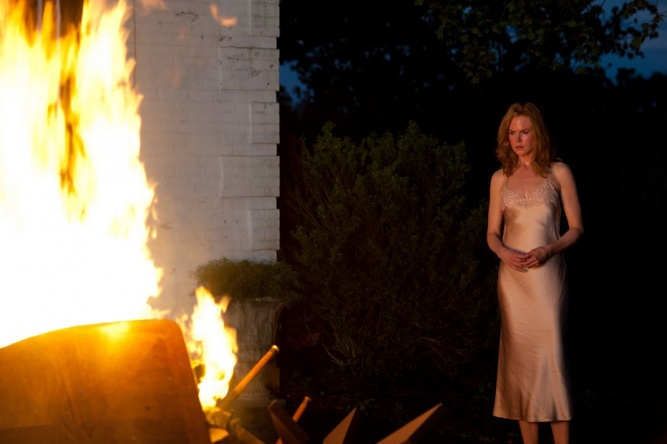 When South Korean genre iconoclast Park Chan-wook decided to bring his peculiar gifts to a Stateside production, anything could have happened - and anything pretty much does in "Stoker," a splendidly demented gumbo of Hitchcock thriller, American Gothic fairy tale and a contemporary kink all Park's own. Led by a brilliant Mia Wasikowska as an introverted teenager whose personal and sexual awakening arrives with the unraveling of a macabre family mystery, this exquisitely designed and scored pic will bewilder as many viewers as it bewitches, making ancillary immortality a safer bet than "Black Swan"-style crossover biz for Fox Searchlight's marvelously mad March hare.
When South Korean genre iconoclast Park Chan-wook decided to bring his peculiar gifts to a Stateside production, anything could have happened - and anything pretty much does in "Stoker," a splendidly demented gumbo of Hitchcock thriller, American Gothic fairy tale and a contemporary kink all Park's own. Led by a brilliant Mia Wasikowska as an introverted teenager whose personal and sexual awakening arrives with the unraveling of a macabre family mystery, this exquisitely designed and scored pic will bewilder as many viewers as it bewitches, making ancillary immortality a safer bet than "Black Swan"-style crossover biz for Fox Searchlight's marvelously mad March hare.
Earmarking future cult items is a fool's errand, but Park's film nonetheless stands to be treasured not just by his existing band of devotees, who should recognize enough of the "Oldboy" and "Thirst" director's loopy eroticism and singular mise-en-scene amid the studio gloss, but by epicurean horror |
|
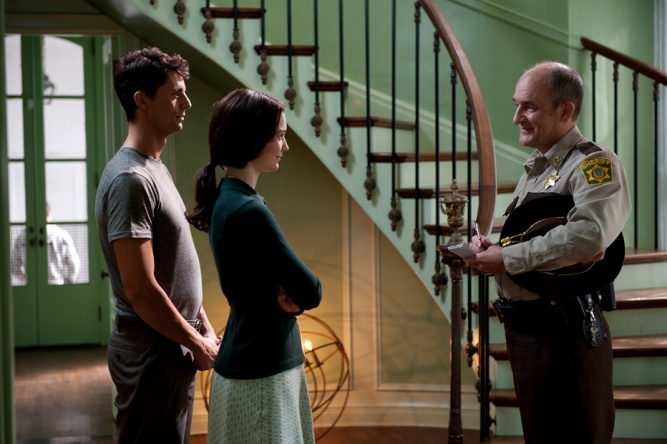 buffs, camp aficionados and even a small, hip sect of post-"Twilight" youths.
buffs, camp aficionados and even a small, hip sect of post-"Twilight" youths.
Not all those auds will follow the stream of wink-wink storytelling references in the brazenly nasty script by Wentworth Miller, the British-born actor best known for his work in TV's "Prison Break," here making his feature writing debut. None is more blatant than the naming of Matthew Goode's antagonist figure. When morbid-minded honor student India (Wasikowska) loses her beloved father, Richard (Dermot Mulroney), in an apparent freak car accident, the ink is barely dry on the death certificate when her globe-trotting uncle Charles (Goode, his unhurried charm and preppy handsomeness put to their best use since 2005's "Match Point"), whom she's never met before, arrives to stay.
Before you can say "Shadow of a Doubt," this urbanely handsome "Uncle Charlie" is arousing India's suspicions (and, it's implied, other things besides) as he swiftly cements himself in the household |
|
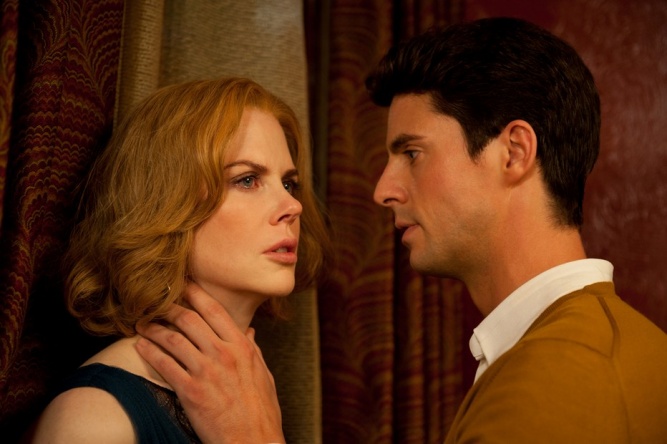 by seducing her brittle, emotionally susceptible mother, Evelyn (Kidman). Shortly afterward, their housekeeper disappears without notice; ditto India's meddlesome aunt (a brief but tangy turn from Jacki Weaver), who appears to know troubling truths about the intruder, dismissed out of hand by Evelyn.
by seducing her brittle, emotionally susceptible mother, Evelyn (Kidman). Shortly afterward, their housekeeper disappears without notice; ditto India's meddlesome aunt (a brief but tangy turn from Jacki Weaver), who appears to know troubling truths about the intruder, dismissed out of hand by Evelyn.
The is-he-or-isn't-he question is answered sooner than Hitch might have done it, as India's darkest instincts about Charles are confirmed by the end of the first half - though, unsurprisingly in this particular story world, this knowledge actually causes her to warm to him a little. (And only a little: when he mentions he desire to be friends, her typically pithy reply is, "We don't need to be friends, we're family.")
But there's still plenty of mileage in Miller's warped family melodrama, as the respective and inevitably linked uncertainties about Richard's death and Charlie's long absence are kept aloft, while Charlie's gradual playing of India and Evelyn |
|
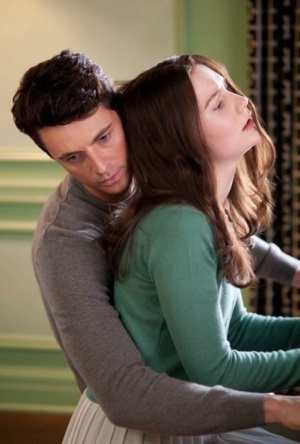 against each other adds queasy sexual tension to an already chilly mother-daughter relationship. Auds will either go with this festering hotbed of secrets, lies and severed heads, or tune out early, and even the faithful may debate whether or not Park, who otherwise oversees proceedings with amused precision, overplays his hand in the bizarre, bloody finale.
against each other adds queasy sexual tension to an already chilly mother-daughter relationship. Auds will either go with this festering hotbed of secrets, lies and severed heads, or tune out early, and even the faithful may debate whether or not Park, who otherwise oversees proceedings with amused precision, overplays his hand in the bizarre, bloody finale.
Material this wild demands actors fully committed to the cause, and Park has found them, particularly in his two female leads. Kidman, here extending her commendable record of counterintuitive auteur collaboration, has such form in the area of passive-aggressive ice queens that her work here shouldn't surprise, but the performance gets more bravely unhinged as it goes along, culminating in a spectacular Mommie Dearest tirade against her daughter that seems ripe for future impressions. Still, it's Wasikowska's film, and she shoulders it with witty aplomb: equal parts Alice in Wonderland and Wednesday Addams, her |
|
 India is in constant, silent argument with the world around her.
India is in constant, silent argument with the world around her.
All the actors are given an invaluable assist from Kurt Swanson and Bart Mueller's crisply tailored costumes, which period-indeterminate even as the film is set in the present day. This kind of chic otherness is also at play in Therese De Prez's superb production design: the Stoker family house, all angular architectural fittings and inventively distorted scale, is a creation worthy of prime Tim Burton.
Park's regular d.p. Chung-hoon Chung appears to be channeling photographer Gregory Crewdson's eerily high-key Americana in his lighting schemes, while Clint Mansell's characteristically rich, modernist score is embellished with haunting piano duets composed specifically for the film by Philip Glass. The repeated use of the Lee Hazlewood/Nancy Sinatra number "Summer Wine," meanwhile, is typical of the director's cockeyed take on American culture. Long may he continue to explore. |
|

|
Bibliografia:
Nota: Si ringraziano 20th Century Fox, Roberta Avolio (Ufficio Stampa) e Orazio Bernardi (QuattroZeroQuattro)
Pressbook:
 PRESSBOOK Completo in ITALIANO di STOKER
PRESSBOOK Completo in ITALIANO di STOKER
 ENGLISH PRESSBOOK of STOKER
ENGLISH PRESSBOOK of STOKER
Links:
• TRACKS - ATTRAVERSO IL DESERTO - VIDEO-INTERVISTA all'attrice MIA WASIKOWSKA e al regista JOHN CURRAN (Interviste)
• Stoker
(BLU-RAY)
Galleria Fotografica:
Galleria Video:
 Stoker - trailer
Stoker - trailer
 Stoker - trailer (versione originale)
Stoker - trailer (versione originale)
<- torna alla pagina Movies & DVD
|
|
|


